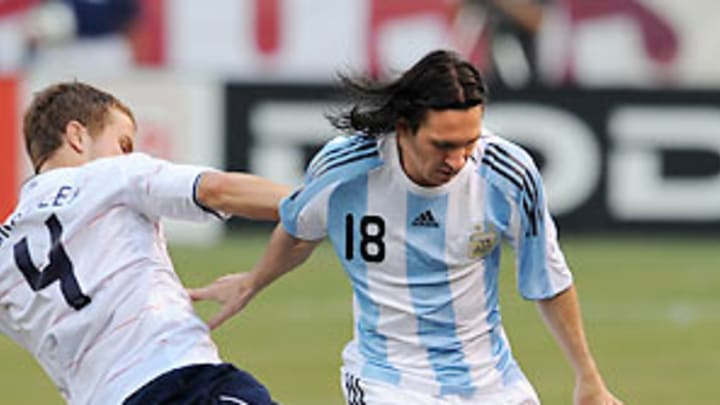Argentina primed to defend gold

The incredibly talented, young Albicelestes are without a doubt the team to beat in the 16-team competition, and have all the necessary ingredients to defend their gold medal from the 2004 Athens Games.
With overage stars such as JuanRomán Riquelme and Javier Mascherano joining the likes of under-23 talents Lionel Messi, Sergio Agüero and FernandoGago, Argentina's Olympic squad looks a whole lot like its full, FIFA No. 6-ranked senior national team. And no other squad in the competition can compete with that pure talent level.
Messi's inclusion will come as a relief to the Argentine camp. After weeks of heated debate surrounding his participation, the 21-year-old wunderkind put an end to speculation on Wednesday by publicly announcing that he will join the rest of his teammates in Beijing after FIFA obligated FC Barcelona to release him, despite the club's refusal to do so.
Everyone who loves soccer -- except for maybe Barcelona and Argentina's three group-stage opponents -- was praying for Messi's inclusion. La Pulga is a joy to watch, and even biased supporters from Argentina's greatest rival, Brazil, have admitted it.
But what's scary is that Argentina could have dominated the field even without Messi's influence. Head coach and 1986 World Cup winner Sergio Batista hand-picked a squad of highly skilled individuals, many of whom play for top European clubs such as Real Madrid, Barcelona, Liverpool and Bayern Munich.
And beyond the big names, there are even more players waiting to break out. One of the squad's three home-based players who are destined to make their mark is River Plate's insanely talented 20-year-old Diego Buonanotte. The 5-foot-2 attacking midfielder was voted the MVP of River's championship run last season, and is keen to impress in what will be his first major international tournament.
It's this pipeline of tremendous talent that makes Argentina the most dominant team in the world when it comes to winning youth tournaments. In addition to the '04 Olympics, Argentina has won five of the last seven FIFA Under-20 World Cups, including the last two editions of the tournament.
Once again, the expectations are huge for Argentina heading into these Games. The names on the roster are perhaps even more recognizable than Brazil (led by two-time FIFA World Player of the Year Ronaldinho). Argentina kicks off Group A play on Aug. 7 with a potentially difficult encounter against an unpredictable Ivory Coast side before what appear to be (on paper, at least) more straightforward matchups with Australia and Serbia.
Los Albicelestes are well aware they are superior to all three of their group opponents, but the danger always exists that they'll underestimate the competition. The notoriously cocky Argentines generally tend to enter tournaments as one of the favorites, but as the senior team learned in its shock first-round elimination at the '02 World Cup, that isn't always a good thing.
In its final preparation match before the Olympics -- a tight 1-0 victory over Japan in Tokyo on Tuesday -- Argentina found it extremely difficult to break down what it referred to as an "ultra-defensive" opponent. Japan knows its tactical limitations, and resorted to hacking to great effect, neutralizing some of Argentina's most dangerous players. Argentina's weary group opponents may adopt similar tactics.
But despite the rough treatment it's expected to receive, Argentina knows that if it sticks to its typical game plan and demonstrates the soccer we all know it can play, it will have little difficulty advancing to the quarterfinals. There, it will face a substantially harder and more adventurous side (which could well be the U.S.).
Argentina's greatest threat is South American rival Brazil. Head coach Dunga counters with an equally strong squad, including Ronaldinho, AlexandrePato, Anderson and Diego. Both sides will be hoping to avoid each other until the final.
Even if Argentina is already anticipating what would be a dream gold-medal showdown with Brazil, first it must concentrate on getting there. If it focuses on playing the kind of soccer that has characterized its game in recent years, the chances of that happening would be that much greater. At this point, Argentina -- and the pressure it puts on itself -- may be its own greatest enemy.
